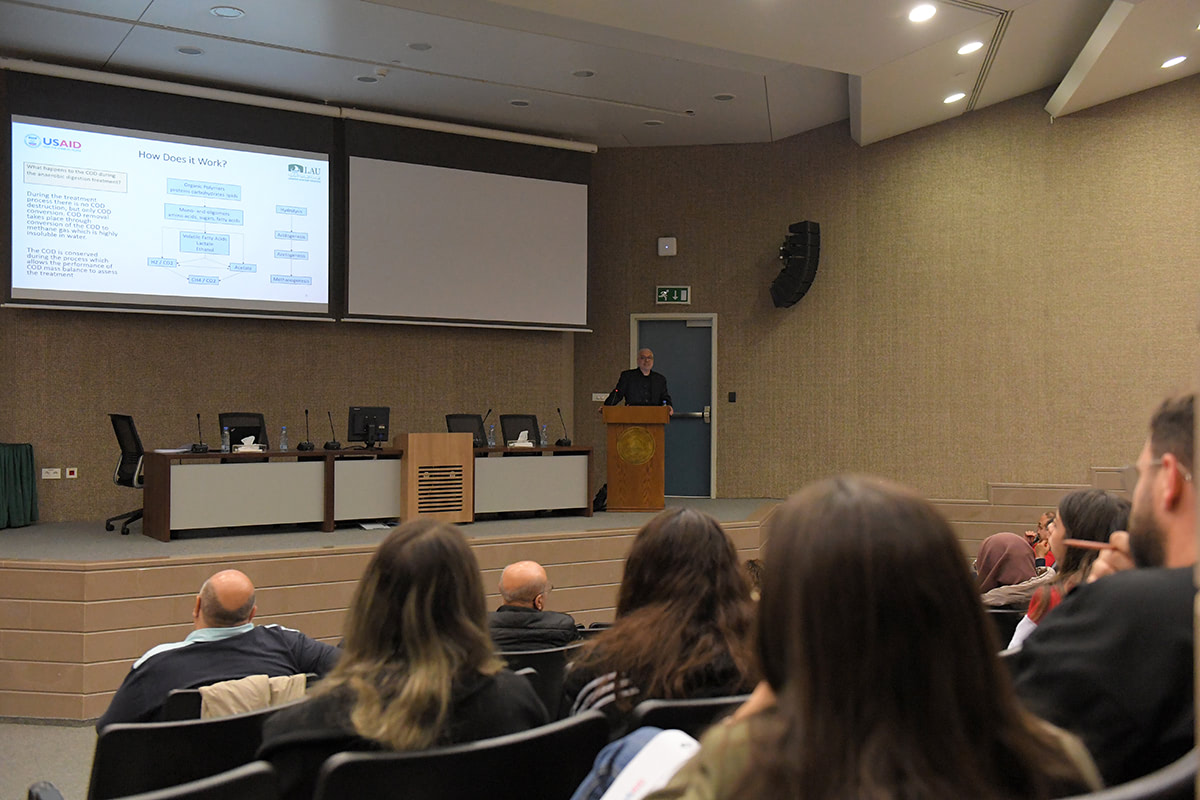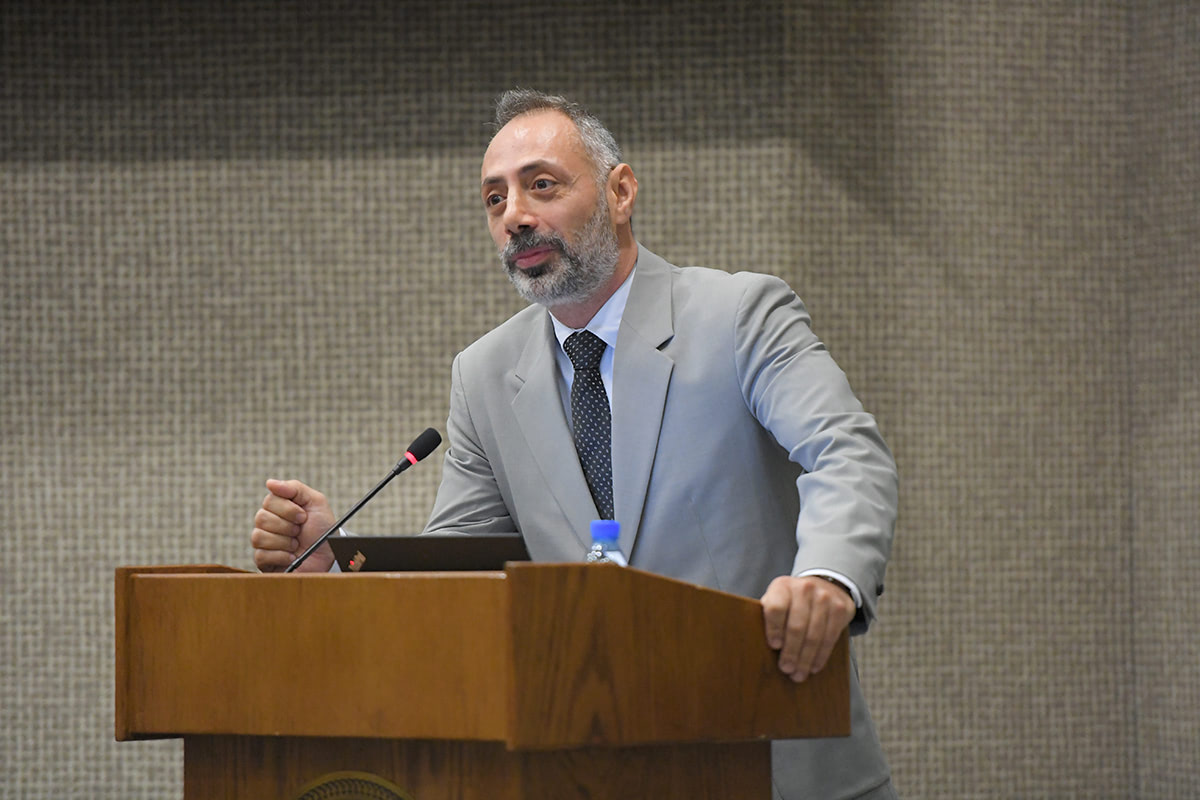A USAID-funded Research Project on Industrial Wastewater Management Yields Sustainable Solution
In the final workshop of the project to treat waste streams in the Litani Basin, engineering faculty urge industries to apply new technology.
A research project by LAU in collaboration with the Litani River Authority to provide a sustainable solution to the pollution of the Litani River Basin has yielded an eco-friendly treatment technology that is effective on all organic waste streams.
Spearheaded by LAU’s Associate Professor of Civil Engineering Mahmoud Wazne who had secured a grant from the US Agency for International Development (USAID), the project entailed perfecting a treatment method for agri-industrial waste based on a newly developed integrated bio-electrochemical reactor technology, in collaboration with Washington State University, and using the by-product, methane, to generate electricity.
This innovative technique for the biodegradation of organic waste could help the Litani River Authority protect the poor communities in the basin’s region from waterborne diseases, while at the same time providing a much-needed source of energy. It would also ensure a supply of clean water as far as Beirut in answer to water shortages.
As Lebanon’s food processing industries show no incentive to manage waste from their factories, said Dr. Wazne, an alternative was to examine biological treatments to produce a more nutrient-balanced waste stream “that can meet both industry and environmental needs.”
The project was conducted by Dr. Wazne in collaboration with Dr. Haluk Beyenal, professor and associate dean for Research and Graduate Studies at the School of Chemical Engineering and Bioengineering, Washington State University; Dr. Stephanie Greige, postdoctoral fellow and research associate at LAU who is a specialist in microbial analysis; and Graduate Research Assistant at LAU’s School of Engineering, Civil Engineering Department, Mohamad Abdallah, in addition to other graduate and undergraduate students.
In the initial phase, the team analyzed the organic materials of various samples from food factories to test the effectiveness of the treatment on each plant. In June, along with Dr. Moustapha Harb, currently assistant professor of Environmental Engineering at New Mexico Tech, they published their findings on anaerobic co‑digestion of cheese whey and poultry slaughterhouse wastewaters. In the second phase, the researchers improved the upflow anaerobic sludge blanket (UASB) reactor – an anaerobic reactor for treating high-strength wastewater – by bioelectrochemical enrichment.
On December 6, the School of Engineering held the second workshop sponsored by USAID, during which Dr. Wazne and his team presented experimental results for the treatment of different waste streams from the upper Litani Basin to show the high efficacy of anaerobic digestion, and galvanize industries to take action.
Among the attendees were specialists in wastewater treatment, environmentalists, civil engineers and engineering companies such as CDM Smith and Dar Al-Handasah, representatives from the wine industry, NGOs, and industries from the upper Litani Basin.
In addition to Dr. Wazne and his team, speakers included Dr. Sami Alawieh, chairman and general director of the Litani River Authority, Dr. Michel Khoury, dean of the School of Engineering, and Dr. Harb.
In his welcome address, Dr. Khoury said that wastewater treatment posed a great challenge in light of the serious health problems caused by contamination. Hence, the importance of the Litani Industrial Wastewater Treatment Project, as it “addresses a critical and operational concern and is therefore in line with the university’s vision to help and cooperate with the community in solving one of the country’s chronic and grave problems.”
In turn, Dr. Alawieh spoke about the partnership between USAID, LAU and the Litani River Authority that, since 2018, has aimed to lay the foundations for addressing industrial pollution in the upper Litani Basin, “the most dangerous among the river’s pollutants.”
Dr. Alawieh attributed the pollution largely to “administrations that approve licenses despite non-compliance with the set conditions, under the pretext of promoting Lebanese industry and developing the Beqaa region.” Wastewater management is costly, he added, but anaerobic digestion offers an affordable and sustainable option.
Noting that there were 600 factories and institutions that pour contaminated industrial wastewater into the upper Litani stream, Dr. Wazne spoke at length about the proposed treatment technique, namely biodegradation of organic waste that does not use fossil fuels with a potential saving of up to 1 kW/kg COD while also producing about 13.5 MJ (megajoules) of energy methane/kg of COD extracted, which can be used to generate power, via methane generation.
More than reducing the flow of pollutants into the river, the importance of this technology lies in the fact that it does not require energy or chemicals, he added, urging the funding institutions to support the establishment of a pilot treatment plant in the upper Litani Basin to demonstrate the effectiveness of anaerobic digestion at the industrial level.
“I received two visits from professionals in the industry who are interested in applying the developed technology in the field, at a factory in the upper Litani Basin,” said Dr. Wazne, “and I am pursuing this opportunity vigorously for the benefit of the community and to highlight the importance of the work being conducted at LAU.”
This project addresses SDGs 3, 6, 7, 11 and 14 of the UN Sustainable Development Goals, namely Good Health and Well-Being, Clean Water and Sanitation, Affordable and Clean Energy, Sustainable Cities and Communities, and Life Below Water.
To browse more scholarly output by the LAU community, visit our open-access digital archive, the Lebanese American University Repository (LAUR).

